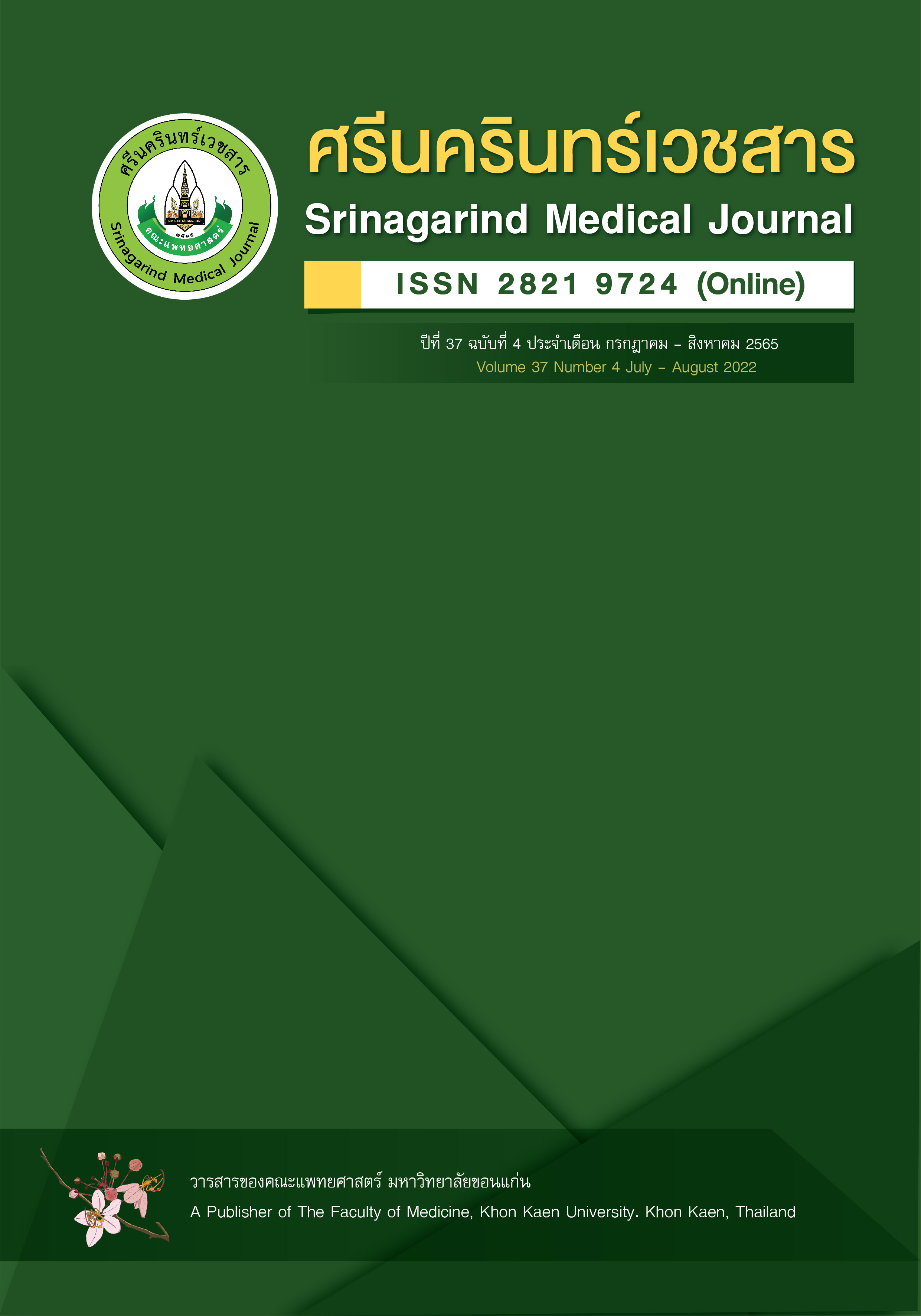การใช้ยาไมโซพรอสตอล (Misoprostol) เหน็บทางรูทวารก่อนผ่าตัดเพื่อลดการเสียเลือดระหว่างเปิดช่องท้องผ่าตัดมดลูก: การศึกษาแบบสุ่มที่มีกลุ่มควบคุม
Preoperative Rectal Misoprostol in Reducing Blood Loss during a Total Abdominal Hysterectomy: A Randomized Double-Blinded Controlled Trial Study
Abstract
วัตถุประสงค์: เพื่อศึกษาเปรียบเทียบผลของการใช้ยาไมโซพรอสตอล (Misoprostol) เหน็บทางรูทวารก่อนผ่าตัดในการลดการเสียเลือดระหว่างผ่าตัดมดลูกโดยการเปิดช่องท้องในผู้ป่วยที่มีความผิดปกติของมดลูกที่ไม่ใช่มะเร็งกับการใช้ยาหลอก
วิธีการศึกษา: การศึกษานี้เป็นการศึกษาแบบสุ่มเปรียบเทียบการใช้ยาไมโซพรอสตอลขนาด 400 ไมโครกรัมเหน็บทางรูทวารก่อนผ่าตัดกับยาหลอกในผู้ป่วยที่มีอายุมากกว่า 18 ปีที่ได้รับการวินิจฉัยความผิดปกติของกล้ามเนื้อหรือโพรงมดลูกที่ไม่ใช่มะเร็งและได้รับการรักษาโดยการผ่าตัดมดลูกออก ในช่วงเดือนพฤศจิกายน พ.ศ. 2562 ถึงมิถุนายน พ.ศ. 2564 โดยได้แบ่งผู้ป่วยที่เข้าร่วมการศึกษาทั้งหมด 120 รายออกเป็น 2 กลุ่ม หลังจากที่ผู้ป่วยถูกถอนออกจากงานวิจัย มีผู้ป่วยจำนวน 58 รายถูกจัดอยู่ในกลุ่มไมโซพรอสตอลและ 57 รายอยู่ในกลุ่มยาหลอก การศึกษาได้ทำการบันทึกปริมาณการเสียเลือดระหว่างผ่าตัด การให้เลือด ระยะเวลาผ่าตัด ระยะเวลานอนโรงพยาบาลและผลข้างเคียงที่เกิดขึ้นจากการใช้ยา
ผลการศึกษา: กลุ่มใช้ยาไมโซพรอสตอลมีค่ามัธยฐานการเสียเลือดระหว่างผ่าตัด 162.0 (50.5-308.0) มิลลิลิตร และ 160.0 (50.0-309.0) มิลลิลิตรในกลุ่มที่ใช้ยาหลอก โดยไม่มีความแตกต่างอย่างมีนัยสำคัญทางสถิติ (p = 0.910) และมีการให้เลือด ระยะเวลาผ่าตัด ระยะเวลานอนโรงพยาบาลและผลข้างเคียงที่น้อยกว่าในกลุ่มใช้ยาไมโซพรอสตอลเมื่อเทียบกับกลุ่มที่ใช้ยาหลอกโดยไม่มีความแตกต่างอย่างมีนัยสำคัญทางสถิติ
สรุป: การใช้ยาไมโซพรอสตอลเหน็บทางรูทวารก่อนผ่าตัดไม่สามารถลดการเสียเลือดระหว่างผ่าตัดมดลูกโดยการเปิดช่องท้องในผู้ป่วยที่มีความผิดปกติของมดลูกที่ไม่ใช่มะเร็งได้
Background and Objective: To compare the blood loss during a total abdominal hysterectomy of the benign uterine disease with preoperative rectal misoprostol administration and a placebo.
Material and Methods: One hundred–twenty patients over 18 years of age, who diagnosed of the benign uterine disease and underwent a total abdominal hysterectomy with or without adnexal surgery, were included from November 2019 to June 2021. The participants were randomized and allocated to undergo either the preoperative administration of the 400 micrograms rectal misoprostol (58 patients) or the placebo (57 patients). This randomized controlled trial recorded the intra-operative blood loss, blood transfusion requirement, operative time, hospital stay, and incidence of all side effects.
Results: The median (IQR) intra-operative blood loss was 162.0 (50.5-308.0) ml for the misoprostol group and 160.0 (50.0-309.0) ml for the placebo group was not statistically significant difference (p = 0.910). The misoprostol group demonstrated lower blood transfusion requirements, operative times, hospital stay, and incidence of side effects than those of the placebo group; but there were no statistically significant differences.
Conclusion: Pre-operative rectal misoprostol administration cannot reduce operative blood loss during a total abdominal hysterectomy.


